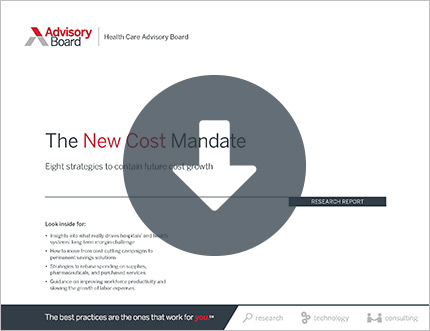Auto logout in seconds.
Continue LogoutSome hospitals are promoting bank loans or credit cards in an effort to ease patients' cost concerns and ensure payment for services—but financial experts have raised questions about the practice, citing high interest rates and other fees to patients.
The CFO's guide to point-of-service collections
Why more hospitals are promoting financial products
As health insurance deductibles rise, patients are paying a larger share of their own medical expenses out-of-pocket, Shefali Luthra reports for Kaiser Health News. As a result, more patients are struggling to pay their bills—and more hospitals are struggling to recoup their costs.
In response, roughly 15% to 20% of hospitals in the United States are now working with lenders to offer loans to patients, according to Bruce Haupt, chief executive of the loan-servicing company ClearBalance. Haupt, along with other industry analysts, project the share of hospitals with such arrangements will increase.
The loan process typically begins during a patient's hospital visit, when a billing representative examines an estimate of the patient's expected out-of-pocket costs. Then, the representative outlines payment plans, and the patient can sign the loan on the spot, Luthra reports.
The lender pays the hospital immediately. The patient then pays the lender in monthly installments, with the lender retaining part of the bill as a fee.
While some providers have promoted one-time loans, others are offering a different financial option to patients: medical credit cards. The cards historically have been offered primarily by dentists, cosmetic surgeons, and veterinarians, but now creditors want to expand to more providers and larger organizations.
Robert Tennant, director of health information technology policy at the Medical Group Management Association, noted the credit cards may appeal to providers because they bring payment right away. "Except for the merchant credit card fees, it's guaranteed payment," Tennant said.
Financial experts raise concerns about affordability
But while loans and credit cards may make it easier for providers to collect payments they're owed, financial experts warn that these loans and credit cards may not always be in patients' best interest.
For instance, patients receiving treatment may not be in a position to understand a complex financial agreement, Luthra reports.
Further, the cost estimates presented to patients who are eligible for a loan may be based on a procedure's list price, rather than the discounted rate that most insurers pay. Mark Rukavina—an expert in medical debt and billing at Community Catalyst, a Boston-based advocacy group—said "If you pay 0% interest on a seriously inflated charge, it's not a good deal," Rukavina said.
Kathleen Engel, a research professor at Suffolk University and an expert in consumer credit and mortgage finance, said that some patients who take out bank loans are "destined to default." She said, "If you have to get a loan for $500 for medical care, that means you are really living at the margins."
Experts raised particular concerns about medical credit cards. Gina Calabrese, co-director of the Public Interest Center at St. John's University School of Law, said, "You're having a medical professional sell someone a credit card. Is that what doctors and dentists should be doing? Do they know enough?"
While medical credit cards typically offer a 0% introductory rate, that interest rate spikes if consumers don't pay down the debt by the time the period ends. For instance, the standard rate offered by CareCredit, a medical credit card company, is 26.99%.
Further, some medical credit card companies have a checkered history. In 2013, the Consumer Financial Protection Bureau ordered CareCredit to pay customers $34 million over deceptive enrollment practices.
And ultimately, loans and credit cards can do only so much to help patients pay off medical debt, which is the No. 1 cause of personal bankruptcy, according to Kaiser Family Foundation. Luthra reports that default rates on medical loans vary throughout the country, with rates around 20% in Texas and Louisiana and around 6% in other areas.
Hospital cites benefit to consumers
Still, some hospitals say that consumers are grateful to have more options for paying for their care.
Sonya Kullmann, a spokesperson for Mercy Hospital, which uses a bank partnership for loans, said the practice is a consumer-friendly strategy. "We've heard from many patients that they appreciate receiving this information as soon as possible because it relieves their worry about paying the costs of their care," Kullmann said (Luthra, Kaiser Health News/Washington Post, 2/19; Gooch, Becker's Hospital CFO Report, 2/20; Finnegan, FierceHealthcare, 2/20; Jackson, Healthcare Financial Management Association, 2/14).
This Wednesday: Get the latest hospital revenue cycle benchmarks
Join our webconference this Wednesday at 3 pm ET where we'll highlight key industry trends, historical analyses, and insights that hospital finance teams need to be aware of.
Don't miss out on the latest Advisory Board insights
Create your free account to access 1 resource, including the latest research and webinars.
Want access without creating an account?
You have 1 free members-only resource remaining this month.
1 free members-only resources remaining
1 free members-only resources remaining
You've reached your limit of free insights
Become a member to access all of Advisory Board's resources, events, and experts
Never miss out on the latest innovative health care content tailored to you.
Benefits include:
You've reached your limit of free insights
Become a member to access all of Advisory Board's resources, events, and experts
Never miss out on the latest innovative health care content tailored to you.
Benefits include:
This content is available through your Curated Research partnership with Advisory Board. Click on ‘view this resource’ to read the full piece
Email ask@advisory.com to learn more
Click on ‘Become a Member’ to learn about the benefits of a Full-Access partnership with Advisory Board
Never miss out on the latest innovative health care content tailored to you.
Benefits Include:
This is for members only. Learn more.
Click on ‘Become a Member’ to learn about the benefits of a Full-Access partnership with Advisory Board
Never miss out on the latest innovative health care content tailored to you.


